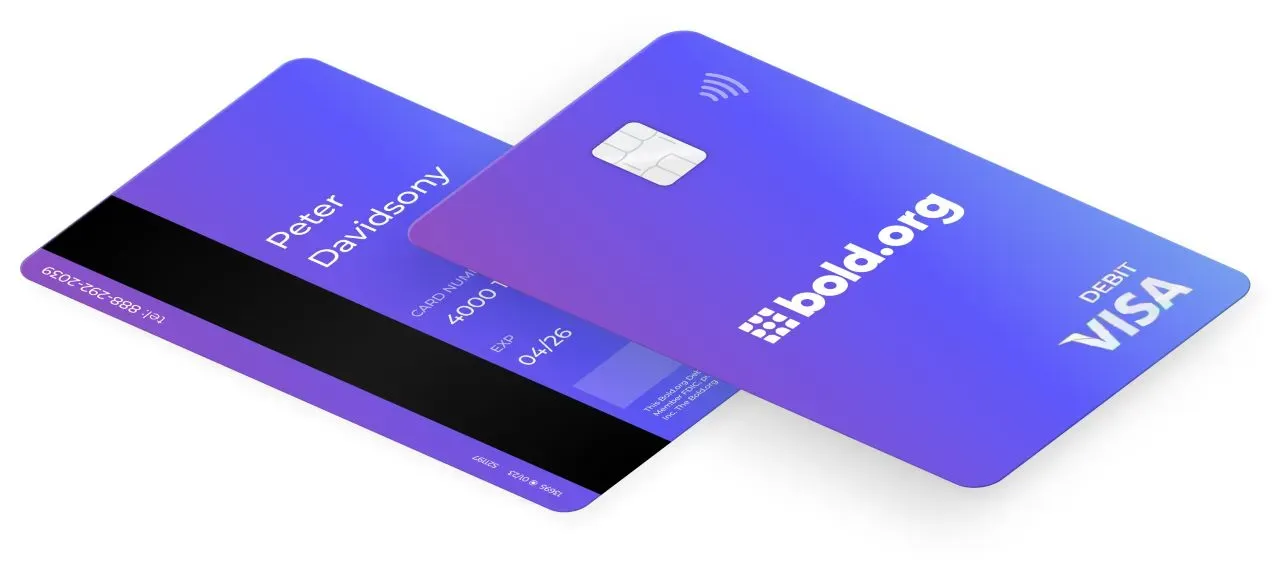Financial Education for Teens: A Practical Guide

The opinions expressed in this article are the author's own and do not reflect the view of Pathward®.
In today's fast-paced and ever-changing world, it is more important than ever for teenagers to have a solid understanding of financial literacy. How finances are taught plays a crucial role in shaping their lives, equipping them with the skills and knowledge needed to navigate the complexities of personal finance and make informed decisions.
In this article, we will explore the importance of financial literacy for teens, delve into the basic concepts of personal finance for teens, discuss practical ways to implement it in daily life and provide valuable resources for enhancing their financial literacy.
Unfortunately, many schools do not offer financial literacy courses. However, having well-rounded financial knowledge is important to help set you up for future success as a student and after you graduate.
Sign up for a Bold.org account today to apply for scholarships to help you pay for college and learn financial management!
The Importance of Financial Literacy
Financial literacy is the ability to understand and utilize various financial skills, including budgeting, saving, investing, and managing debt. It empowers individuals to make sound financial choices that can positively impact their present and future financial well-being. For teenagers, financial literacy is particularly crucial as it can help lay the foundation for a lifetime of financial success.
When teenagers have a solid understanding of financial literacy, they are better equipped with the knowledge and skills necessary to navigate the complex world of personal finance. By learning about budgeting, teenagers can develop the discipline to allocate their income wisely and have saving goals, ensuring that they have enough for their needs while still saving money for the future.
Financial literacy helps teenagers understand the importance of saving. They learn about the power of compound interest and how it can grow their money over time. With this knowledge, they are more likely to start saving early and regularly, setting themselves up for financial security in the long run. By instilling these habits at a young age, teenagers can develop a strong foundation for building wealth and achieving their financial goals.
Apply for the Bold Debit Card today!
The Role of Personal Finance in a Teen's Life
Financial education plays a significant role in a teen's life by providing them with the important knowledge and skills to help manage their money effectively. It teaches them the basics of personal finance, such as tracking, saving, and investing, which are essential for building a strong financial future. According to an impact evaluation conducted by the National Endowment for Financial Education in 2003-2004, teenagers who receive financial education are more likely to save money and exhibit responsible financial behaviors compared to those who do not.
Financial education goes beyond teaching teenagers how to balance a checkbook or create a budget. It also helps equip them with critical thinking skills to evaluate financial products and services. They learn to differentiate between needs and wants, make informed decisions when it comes to borrowing money, and understand the potential risks and rewards of different investment options. These skills are invaluable in today's complex financial landscape, where young people are bombarded with advertisements and faced with numerous choices.
Moreover, this education helps teenagers develop a sense of financial responsibility and independence. They learn to take ownership of their financial decisions and understand the consequences of their actions. By empowering teenagers with financial knowledge, they become less reliant on others for financial support and more capable of achieving their financial goals.
Do you like what you're reading? Visit our Scholarship Blog to read more articles on college life, student finances, application processes, and more!
Get Matched to Thousands of Scholarships
Create your Bold.org profile to access thousands of exclusive scholarships, available only on Bold.org.
Create Free ProfileIntroduction to Saving and Investing for Teens
One of the fundamental concepts of financial education is understanding the importance of saving and investing. Encouraging teens to develop a saving habit early on can have long-term benefits.
In March 2018, Junior Achievement USA and AIG conducted a survey with 1,000 teenagers aged 13 to 18 to explore their views and understanding of personal finance and financial decision-making. Participants in the survey were queried about the potential value of offering personal finance courses in high school. A resounding 95 percent of them agreed that it would be beneficial.
Teaching teens about investing is equally important. Introducing them to the concept of compound interest and the power of long-term investments can instill a sense of future-oriented thinking and help them build wealth over time. A great way to introduce these concepts is through a high-yield savings account.
When it comes to saving, there are various strategies that teens can explore. They can open a savings account at a local bank or credit union, set up automatic transfers from their allowance or part-time job earnings, or even consider investing in low-risk financial instruments such as certificates of deposit (CDs) or government bonds. By diversifying their savings portfolio, teens can learn about different investment options and develop a well-rounded understanding of financial management.
Furthermore, understanding the role of inflation is crucial for teens when it comes to saving and investing. They need to grasp the concept that the value of money decreases over time due to inflation and that investing can help combat the erosion of purchasing power. Explaining the potential benefits of investing in stocks, bonds, or mutual funds can broaden their knowledge and open up opportunities for long-term financial growth.
Please note that this information is for educational purposes only and should not be considered as investment advice. Always consult a financial advisor or other professional for specific financial guidance.

Understanding Credit and Debt
An essential aspect of financial education is teaching teens about credit. They need to understand the concept of credit scores, interest rates, and the responsible use of credit. When discussing credit, it is important to emphasize the significance of building a good credit history from an early age.
Teens should be aware that their credit score can impact their ability to secure loans, rent an apartment, or even get a job in the future. Maintaining a good credit score is vital. Educating them about the factors that influence credit scores, such as payment history, credit utilization, and length of credit history, can empower them to make informed decisions and maintain a healthy profile.
Furthermore, educating teens about the potential dangers of excessive debt and the importance of managing debt responsibly can help prevent them from falling into the cycle of debt early in life. They should understand the difference between good debt, such as student loans, which can lead to increased earning potential, and bad debt, such as high-interest credit card debt, which can hinder their financial progress.
Teaching teens about debt repayment strategies, such as the snowball or avalanche method, can help equip them with practical tools to tackle their debts effectively. By understanding the consequences of excessive debt and the benefits of responsible borrowing, teens can make informed decisions and avoid financial pitfalls in the future.
Understanding Debit Cards
Along with credit cards and understanding credit, teens should also understand the importance of debit cards. They have their own function and benefits different from credit cards, and a lot of time they are much safer for teens who are just starting with using cards.
Debit cards differ from credit cards in that you are spending the money that you have in your designated account rather than using a credit card that credit card companies give you monthly. This is great for teens learning new financial responsibility because they do not have to worry about making monthly payments. This means you also don't have to worry about any late fees because there are no payments.
Having a debit card as your first card or primary card as a teen can help you budget more accurately because you are only spending money that you have. Goal setting can also be much easier because you can accurately track everything that leaves your bank account and what money comes in. It can give them a sense of responsibility over their own finances.

Bold Visa® Debit Card
A great debit card for students is the Bold Debit Card! This debit card allows you to earn and redeem Bold Points.* How it works is that for every $1 spent on eligible purchases, 1 Bold Point is earned. What makes the Bold Debit Card different is that you can either redeem your points at a 1x rate for cashback, or you can redeem your points at a 1.5x rate in student loan payment!*
Your daily spending with the Bold Debit Card can become a new way to tackle your student loans. What's better than that? You are able to set up direct deposit with your Bold Debit Card and also easily transfer money in and out.†
The Bold Debit Card can give you peace of mind as there are no interest charges, annual fees, or hidden fees whatsoever.† It can be a great card to help teach teens financial responsibility and also a smart way to spend money because it works for you.
Sign up for the Bold Debit Card today and experience a card that can help you fund your education!
Get Started with the Bold Debit Card
Earn rewards that help pay for school.* Apply for the Bold Debit Card today!
Join Bold.orgBudgeting and Expense Tracking
Budgeting is a fundamental skill that teens need to acquire as part of their financial education. Teaching them how to create a budget, allocate their income to various expenses, and track their spending can foster responsible financial habits.
When introducing budgeting to teens, it can be helpful to emphasize the importance of setting financial goals. By encouraging them to identify short-term and long-term goals, such as getting their first summer jobs, saving for their first car, and paying college tuition, teens can develop a sense of purpose and motivation to manage their money effectively.
Moreover, teaching teens about the different categories of expenses can provide them with a comprehensive understanding of budgeting. They should learn about fixed expenses, such as rent or mortgage payments, utilities, and insurance, as well as variable expenses, such as groceries, entertainment, and transportation. By categorizing their expenses, teens can prioritize their spending and make informed choices about where to allocate their money.
According to a survey called Survey of the States conducted by the Council for Economic Education in 2022, only 21 states in the United States require high school students to take a course in personal finance. This highlights the need for an increased focus on budgeting and expense-tracking education to better prepare teenagers for the financial situations they will face in adulthood.
Teaching teens about the importance of tracking their expenses can also be beneficial. By keeping a record of their spending, either through a physical notebook or apps, teens can gain insights into their financial habits and identify areas where they can cut back or save more. This practice can help them develop a sense of financial responsibility and become more mindful of their spending habits.

Implementing Personal Finances in Daily Life
Practical Money Management Skills
To effectively implement financial education in a teen's daily life, it is crucial to focus on practical money management skills. This includes teaching them about the importance of setting financial goals, distinguishing between needs and wants, and developing strategies for saving and spending wisely.
Incorporating real-life examples and interactive activities can help make the learning process more engaging and relatable for teens. For instance, assigning them the task of creating a personal budget based on their own financial goals and income can provide hands-on experience in money management.
One way to be proactive about your financial health is to apply for scholarships! The more money you can save on your education, the better. Check out Bold's thousands of different scholarships to find some that fit you.
Teaching Teens About Financial Responsibility
Financial responsibility is a key aspect of financial education that should be emphasized when teaching teens about money. This involves instilling in them the values of accountability, self-discipline, and making informed decisions regarding their finances.
Teaching teens about the consequences of financial choices, such as the impact of excessive spending or the benefits of long-term savings, can help them develop a sense of financial responsibility and prepare them for the challenges they may face in the future.
Overcoming Challenges in Financial Education
Addressing Common Misconceptions About Money
When it comes to financial education, there are several common misconceptions that need to be addressed. One prevalent myth is that managing money is only for adults. By dispelling this myth and emphasizing the importance of financial literacy for teens, we can encourage them to start building healthy financial habits early on.
Another misconception is that financial education is only for those who come from affluent backgrounds. However, financial education is relevant for individuals from all socioeconomic backgrounds and can be tailored to meet the specific needs and circumstances of each individual.
Dealing with Peer Pressure and Finances
Peer pressure can significantly influence a teen's financial decisions, making it important to address this challenge frequently. By teaching teens how to resist impulsive buying and make independent financial choices, they can become more confident in managing their money responsibly.
Incorporating real-life scenarios and role-playing exercises can help teens develop the skills necessary to navigate peer pressure and make sound financial decisions, empowering them to stay true to their financial goals.
Resources for Enhancing Financial Literacy
Recommended Books and Online Courses
There are various resources available that can help teens enhance their financial literacy. Books such as "Rich Dad Poor Dad" by Robert Kiyosaki and "The Millionaire Next Door" by Thomas J. Stanley offer valuable insights into personal finance and wealth-building.
Online courses like Khan Academy's Personal Finance and Investopedia's Financial Education Series provide interactive and comprehensive modules tailored specifically for teens, covering a wide range of financial topics.
Financial Literacy Apps and Tools for Teens
In today's digital age, there are also numerous financial literacy apps and tools designed specifically for teens. Apps like Mint and PocketGuard can help them track their spending, set savings goals, and develop healthy financial habits.
Giving teens a financial education is a valuable investment in their future. Whether it's understanding the importance of financial literacy, grasping the basic concepts, implementing financial education in daily life, overcoming challenges, or utilizing the available resources, financial education is an essential component of their overall education.

Frequently Asked Questions About Financial Education for Teens
Are credit cards or debit cards better for teens?
It depends on your responsibility level. If a teen is more responsible, opening a credit card may not be a bad idea, but it is actually a great way to strengthen credit. However, debit cards are often seen as the safer option for teens. You don't have to worry about going over your credit limit or making payments on time. For the most part, debit cards can be a safer beginner option.
Who is the Bold Debit Card made for?
The Bold Debit Card was made for anyone who is a student or is dealing with student loans. Points you earn can go toward payments on your loans or be used as cashback. It's up to you! If you or someone you know fits that description, make sure to check out the Bold Debit Card today!
At what age should teens begin to educate themselves to gain financial knowledge?
The earlier, the better! Thinking about your spending habits and how you save (or don't) your money is something to always think about. A great time to think about your first debit card or opening a bank account could be when you get your first job. But it could be even before that. Many teens open up checking accounts and debit cards before their first job to become more responsible with spending. The timeline is up to you, but it is never too early to start thinking about financial literacy!
Check out Bold.org for more info on our Bold Debit Card, student finance articles, and thousands of different scholarships to apply for. Bold.org is the place for your student needs.
Bold.org Visa® Debit Card is a demand deposit account provided by Pathward®, N.A., Member FDIC. Bold.org Visa Debit Card is issued by Pathward, N.A., Member FDIC, pursuant to a license from Visa U.S.A. Inc. Card can be used everywhere Visa debit cards are accepted. Visa is a registered trademark of Visa U.S.A. Inc. All other trademarks and service marks belong to their respective owners. Register your Card for FDIC insurance eligibility and other protections.
*This product or service is independent of Pathward® and Visa and is neither endorsed nor sponsored by Pathward® or Visa.
†The features associated with the Bold Debit Card discussed in this blog post are provided by Bold.org and are not affiliated with our Bank partners, Pathward®, or Visa.